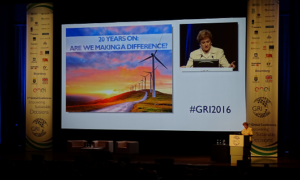Leading the sustainability evolution
We are at a key moment in the evolution of sustainability. Transparency is inescapable; it is becoming the new paradigm for conducting business. The Rana Plaza tragedy in Bangladesh in 2013, and the more recent Panama Papers scandal, highlight the critical need for us to continue pushing the sustainability agenda. “Tools and methods need to evolve,” urged Michael Meehan. ”There can no longer be a ‘one size fits all’ strategy. It is imperative that we no longer work in silos with competing standards, and frameworks. We need the ‘walled gardens’ of sustainability to come down.”
The changing focus and deepening issues in corporate social responsibility over the past two decades have been captured in the evolution of GRI Standards. Over the years more than 33,000 sustainability reports have been collected in the GRI Sustainability Disclosure Database, created by thousands of companies across the world.
Multi-stakeholder input essential then and now
GRI’s multi-stakeholder network has been at the core of this sustainability evolution. Development of GRI Standards relies on this multi-stakeholder approach, combining the best combination of technical expertise and diversity of experience to address the needs of all report makers and users. This approach enables GRI to produce universally-applicable reporting guidance. All elements of GRI Standards are created and improved using a consensus-seeking approach, and considering the widest possible range of stakeholder interests which includes business, civil society, labor, accounting, investors, academics, governments and sustainability reporting practitioners.
Multi-stakeholder representation was essential for GRI right from the very start: “Back in the 1990’s there was a large gap between what was going on in the world and the CEOs of business,” explained Bob Massie, Co-founder of GRI, and Executive Director, Sustainable Solutions Lab, University of Massachusetts Boston. “There were increasing global problems in the 1990s, but none of these formed part of normal market decisions in business. Voices from stakeholders outside of business were not heard. GRI opened the process to a much wider group of stakeholders in the development of its Standards. It created a place for those voices to be heard. There is still much work to be done on this today, but these previously unheard stakeholders formed a key reason for GRI’s vision.”
How are GRI Standards placed to support the future?
“The GRI G4 Guidelines are evolving into a new set of modular, interrelated GRI Standards to enable reporting organizations to make a greater contribution to sustainable development and meet emerging stakeholder needs by enhancing the quality, comparability and accessibility of sustainability information,” explained Eric Hespenheide, Chairman of the Global Sustainability Standards Board.
The new modular structure of GRI Standards will enable individual standards to be updated independently, which will ensure that the standards remain consistent with authoritative intergovernmental instruments and developments in specific content areas. It will also allow for focused, timely and continuous maintenance of contents rather than at one specific point in time, while giving organizations continued confidence that they are reporting in line with global best-practice.
A new era of collaboration
Partnerships and collaboration will also be vital for furthering the sustainability agenda. In particular, GRI will be focusing on partnerships for sustainable development, and for technology and innovation over the next five years. “Sustainability issues need to be embedded in all decisions by governments and businesses,” explained Michael Meehan. “The first step in achieving this is collaboration. GRI is convening with leading names around the world, including Tata Consultancy Services, Dell, Microsoft, and many others, to promote the dialogue on how we will reach the next era.”
The investor community will also need to be more involved in the new era of corporate disclosure to help create the shift needed within financial markets to enable sustainable development. Organizations need to ensure they are incorporating investors into their multi-stakeholder approach to sustainability and reporting.
Peter Blom, CEO, of Triodos Bank explained the changes needed within the banking industry to lead us to a more sustainable economy. “We need to make the banking profession human again. Then, the industry can really help with financing the move to a more sustainable economy. Organizations need to look back at their original goals; our future relies on companies rediscovering their purpose.”




